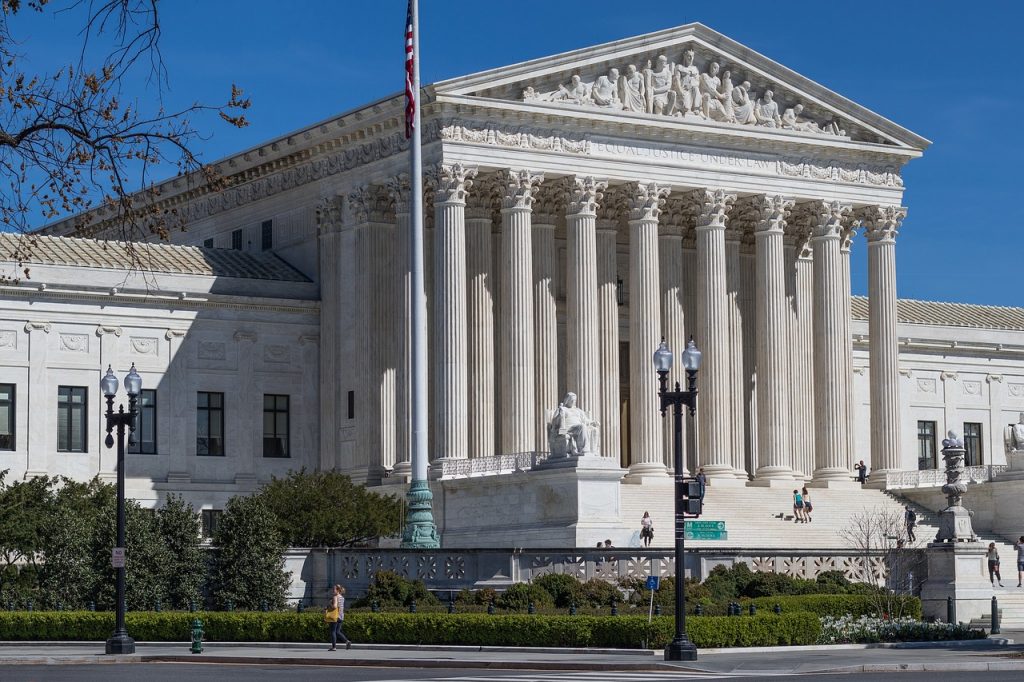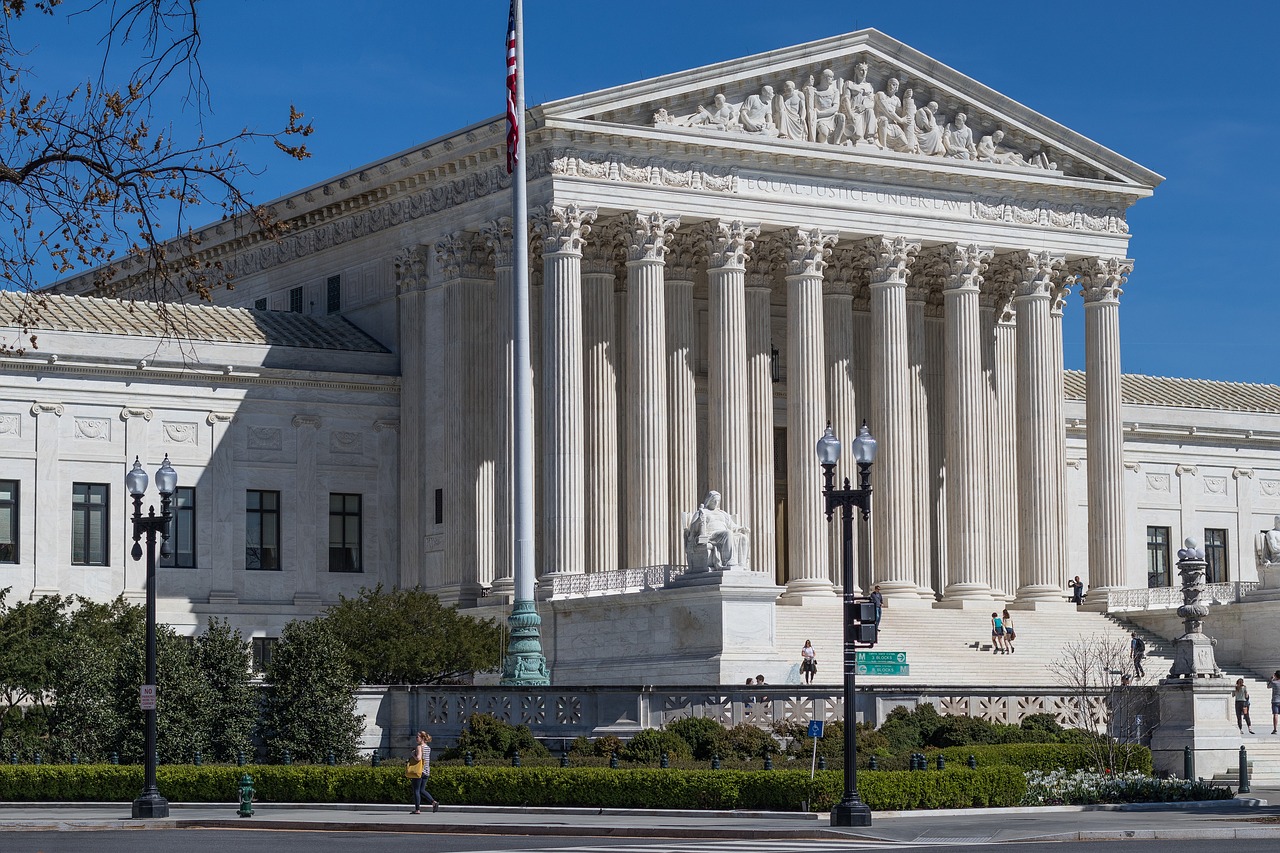
U.S. Supreme Court October Term 2021- Cases To Watch Out For
After conducting its proceedings virtually for about 19 months due to the Covid-19 pandemic, the Supreme Court finally resumed its in-person oral hearings on October 04, 2021. The nine-justice bench, marked by a conservative majority (6-3) will hear some important and contentious matters relating to religion, abortion, discrimination, and guns. Here are some of these pivotal cases that are on the Court’s radar during this term:
Dobbs v. Jackson Women’s Health Organization
The case concerns the validity of the Gestational Age Act passed by lawmakers in Mississippi in 2018. The law bans abortions after 15 weeks of pregnancy, except in cases of medical emergency or fetal abnormality. While considering the case, the Supreme Court may touch upon and possibly overturn its landmark ruling in Roe v. Wade, where through a 7-2 majority, the court ruled that certain Texas laws criminalizing abortion in most instances were unconstitutional as they violated a woman’s right to privacy.
Jackson Women’s Health Organization, the only abortion clinic in Mississippi, challenged the constitutional validity of the Act. While arguing the case, the state legislature submitted that firstly, worldwide, 75% of countries to do not permit abortions after 12 weeks gestation and secondly, past five to six weeks gestation, an unborn human’s heart starts beating and “all basic physiological functions are present” by the ninth week. Other submissions made by the state were state interest, the health of the mother, a desire to protect an unborn’s life, and the medical profession. It submitted that the practice is “barbaric” and “demeaning to the medical profession.”
The U.S. District Court for the Southern District of Mississippi held that the law is unconstitutional. Mississippi’s State Health Officer, Thomas Dobbs, appealed the decision before the U.S. Court of Appeals for the 5th Circuit for review. The court affirmed the lower court’s ruling. After that, he petitioned the Supreme Court and a review was granted.
The decision, in this case, will probably be the most important one in the last 30 years. The court is set to hear the matter on December 01, 2021. While deciding on the constitutionality of such abortion laws, the court will probably also consider if the ruling in Roe v. Wade will still be applicable in the future.
The Texas and Mississippi abortion laws are significantly different from each other. The Texas law bans most abortions after the sixth week of pregnancy and does not make exceptions for pregnancies originating from rape or incest. Further, a civil suit can be initiated by anyone against anyone who “aids or abets” in abortion. The Supreme Court refused to ban the enforcement of Texas anti-abortion law on September 01, 2021. The Department of Justice has requested the Supreme Court to block the controversial Texas abortion law.
Carson v. Makin
Set to be heard on December 08, 2021, the case questions Maine’s law prohibiting the usage of state funds from the state’s tuition assistance program for schools teaching “sectarian” religious content.
The federal district court and the U.S. Court of Appeals for the 1st Circuit ruled against the petitioners, the Carson, Nelson, and Gillis families. The suit was filed by these three families who wanted their kids to attend accredited private schools, however, they were denied public financial assistance as the schools they selected did not meet the nonsectarian requirement. These families argued that the “nonsectarian” requirement violated their constitutional rights, including the right to free exercise of religion provided under the First Amendment.
In 2020, in the case of Espinoza v. Montana Department of Revenue, the Supreme Court decided that the state of Montana cannot keep out families or schools from a scholarship program open to all merely based on a school’s religious status. The lower courts that ruled against the petitioners in Carson v. Makin held that there is a difference between use-based and status-based restrictions.
While hearing the case, the Supreme Court will consider the following question: By barring students from using their student-aid funds towards attending schools that provide religious education, does a state law violate the First or Fourteenth Amendments. The matter will be heard on December 08, 2021.
New York State Rifle & Pistol Association v. Bruen
The question, in this case, concerns a restrictive New York gun law. Gun laws in New York require applicants for a concealed carry permit to prove that they have a good reason for carrying the weapon. The Supreme Court will be reviewing an important Second Amendment case after more than a decade. In 2008, in the case of District of Columbia v. Heller, the Supreme Court decided that a private citizen’s right to keep a firearm inside their own home for “traditionally lawful purposes” including self-defense is provided under the Constitution.
The current case was filed by Robert Nash and Brendan Koch after a licensing officer rejected their applications on the ground that they could not show “a special need for self-defense that distinguished [themselves] from the general public.” In their submissions, the petitioners challenged this “proper cause” standard stating that it violated the Second Amendment.
The district court and the 2nd circuit court did not agree with these submissions. An earlier case of Kachalsky v. County of Westchester was relied upon by them, wherein it was held that such restrictions are constitutional and can be imposed by the state.
Set to be heard on November 03, 2021, the case will involve a decision about the rights of private citizens to carry firearms outside their homes.
CVS v. Doe
Scheduled to be heard on December 07, 2021, the case involves a question about the policies that disparately impact disabled groups. The court will decide if such policies are against the anti-discrimination provisions of the Rehabilitation Act and the Patient Protection and Affordable Care Act.
Five HIV-positive persons who relied on employer-sponsored healthcare plans to get their specialty drugs initiated a federal discrimination suit against CVS Caremark, a pharmacy benefits management company. The company rules required them to receive these medications only through specified specialty pharmacies. The specialty medications were available at “in-network” prices only when purchased through these designated pharmacies. Further, these drugs were available only through home delivery or pickup at CVS stores.
The petitioners claimed that such rules created differentiated pricing and lack of privacy and therefore, violated the anti-discrimination provisions of the Affordable Care Act and also Section 504 of the Rehabilitation Act, which is incorporated into these anti-discrimination provisions.
The question before the Supreme Court is whether a disparate-impact cause of action is available for disability-related discrimination allegations under Section 504 and thus, the ACA.

